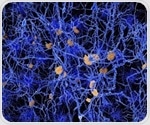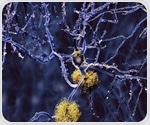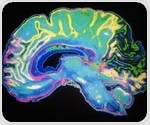| |  Few effective strategies have been shown in randomized clinical trials to improve memory or slow cognitive decline among older adults. Few effective strategies have been shown in randomized clinical trials to improve memory or slow cognitive decline among older adults. | |
|
| |  In a noteworthy case study published in the Journal of Alzheimer's Disease investigators report autopsy findings in a 65-year-old woman with Alzheimer's disease (AD) who received three open label infusions of the experimental anti-amyloid beta (Aβ) antibody drug lecanemab. In a noteworthy case study published in the Journal of Alzheimer's Disease investigators report autopsy findings in a 65-year-old woman with Alzheimer's disease (AD) who received three open label infusions of the experimental anti-amyloid beta (Aβ) antibody drug lecanemab. | |
|
| |  A new study conducted by researchers at the University of Eastern Finland discovered that the APP A673T genetic variant, which protects against Alzheimer’s disease, alters levels of several proteins and peptides linked to amyloid-beta metabolism in human biofluids and cell culture models, including amyloid beta itself. A new study conducted by researchers at the University of Eastern Finland discovered that the APP A673T genetic variant, which protects against Alzheimer’s disease, alters levels of several proteins and peptides linked to amyloid-beta metabolism in human biofluids and cell culture models, including amyloid beta itself. | |
|
| |  Why do some people develop Alzheimer's disease while others don't? And, even more puzzlingly, why do many individuals whose brains are chock-full of toxic amyloid aggregates-;a telltale sign of Alzheimer's brain pathology-;never go on to develop Alzheimer's-associated dementias? Why do some people develop Alzheimer's disease while others don't? And, even more puzzlingly, why do many individuals whose brains are chock-full of toxic amyloid aggregates-;a telltale sign of Alzheimer's brain pathology-;never go on to develop Alzheimer's-associated dementias? | |
|
| |  While age-related brain disorders like Alzheimer's disease often develop slowly across an individual's lifetime, they usually aren't detected until symptoms have already started. While age-related brain disorders like Alzheimer's disease often develop slowly across an individual's lifetime, they usually aren't detected until symptoms have already started. | |
|
| |  Dementia is defined as the loss of cognitive functioning-;including thinking, remembering, and reasoning-;and is very prevalent in Japan. Dementia is defined as the loss of cognitive functioning-;including thinking, remembering, and reasoning-;and is very prevalent in Japan. | |
|
| |  Researchers develop a lipid nanoparticle-formulated mRNA-based antigen encoding three SARS-CoV-2 peptides derived from non-structural proteins. Researchers develop a lipid nanoparticle-formulated mRNA-based antigen encoding three SARS-CoV-2 peptides derived from non-structural proteins. | |
|
| |  In this behind-the-scenes interview, we speak to Dr. Sinead Knight, chair of SLAS Europe 2023, about this years programme, highlighting the key topics and speakers. In this behind-the-scenes interview, we speak to Dr. Sinead Knight, chair of SLAS Europe 2023, about this years programme, highlighting the key topics and speakers. | |
|
| |  Weill Cornell Medicine has been awarded a five-year, $11.6 million grant from the National Institute on Drug Abuse of the National Institutes of Health to study the effects cannabis, including marijuana and compounds derived from it, may have on the brains of those living with HIV. Weill Cornell Medicine has been awarded a five-year, $11.6 million grant from the National Institute on Drug Abuse of the National Institutes of Health to study the effects cannabis, including marijuana and compounds derived from it, may have on the brains of those living with HIV. | |
|
| |  A possible explanation has been found in a study for why apoE4, the most significant genetic risk factor associated with Alzheimer's disease, fails to protect the brain from inflammation. A possible explanation has been found in a study for why apoE4, the most significant genetic risk factor associated with Alzheimer's disease, fails to protect the brain from inflammation. | |
|
| |  People with a genetic predisposition for Alzheimer's disease may have an increased risk of epilepsy and people with a certain type of epilepsy may have an increased risk of developing Alzheimer's disease, according to a study published in the May 24, 2023, online issue of Neurology®, the medical journal of the American Academy of Neurology. People with a genetic predisposition for Alzheimer's disease may have an increased risk of epilepsy and people with a certain type of epilepsy may have an increased risk of developing Alzheimer's disease, according to a study published in the May 24, 2023, online issue of Neurology®, the medical journal of the American Academy of Neurology. | |
|
| |  People who experience a type of stroke linked with nearly half of all dementias could be treated for the first time by repurposing two cheap and common drugs, a trial shows. People who experience a type of stroke linked with nearly half of all dementias could be treated for the first time by repurposing two cheap and common drugs, a trial shows. | |
|
| |  A $4.5 million groundbreaking grant will fund research to explore a promising link between aerobic exercise and slowing the progression of Alzheimer's disease in a study led by an Arizona State University researcher. A $4.5 million groundbreaking grant will fund research to explore a promising link between aerobic exercise and slowing the progression of Alzheimer's disease in a study led by an Arizona State University researcher. | |
|
| |  A new research paper was published in Aging (listed by MEDLINE/PubMed as "Aging (Albany NY)" and "Aging-US" by Web of Science) Volume 15, Issue 9, entitled, "Exogenous exposures shape genetic predisposition to lipids, Alzheimer's, and coronary heart disease in the MLXIPL gene locus." A new research paper was published in Aging (listed by MEDLINE/PubMed as "Aging (Albany NY)" and "Aging-US" by Web of Science) Volume 15, Issue 9, entitled, "Exogenous exposures shape genetic predisposition to lipids, Alzheimer's, and coronary heart disease in the MLXIPL gene locus." | |